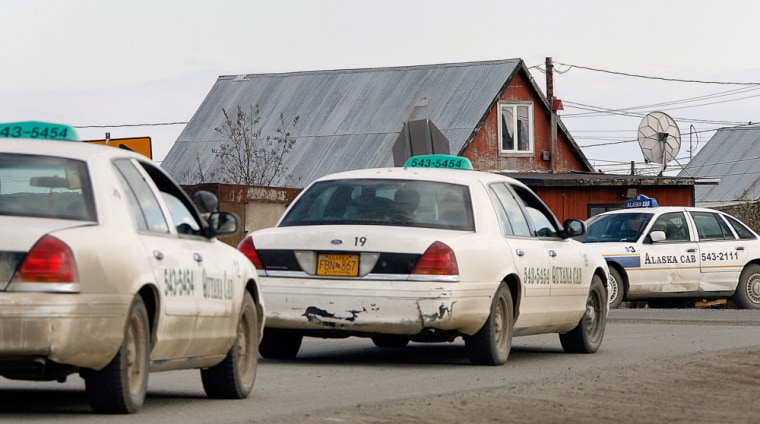You won't find a luxury hotel or concert hall in Bethel, and you probably can't even get a decent bagel here. But this remote Alaska town has at least one advantage over New York City: It may be the nation's taxicab capital.
Situated on the tundra about 400 miles west of Anchorage, Bethel has 70 taxis for a population of just 5,900. That's one cab for every 84 people.
That's better even than New York, the ultimate cab city, where there is one hired vehicle —such as a taxi, commuter van or livery car — for every 149 people.
"It's most likely by far the highest ratio of taxis per residents in the United States," said Alfred LaGasse with the Taxicab, Limousine & Paratransit Association.
The main reason for the big fleet of taxis: Bethel, which is surrounded by thousands of ponds in a delta plain, is inaccessible by road. People must fly cars in or bring them in by barge on the Kuskokwim River — and that is way too expensive for Bethel's many poor.
"I bought a small Ford Focus and it cost $2,000 to fly it in," said Mark Springer, chairman of the local transportation commission. "Then of course, there's the cost of gas, almost $5 a gallon here. Cabs in Bethel are very, very convenient."
Fewer than half the adults have their own car or truck. Some families own snowmobiles, but those are good only in winter.
As a result, taxi drivers — many of them non-Alaskans, mostly notably Koreans and Albanians — have flocked here to fill the gap. Cabs are seemingly everywhere, squeezing in passengers who pay $4 to go anywhere in the main part of town, and $6 to the airport three miles away.
The high number of vehicles for hire was a big surprise when Wally Baird moved here from Nebraska two years ago to take a job as city manager.
"In every place I've ever lived and worked you're lucky to see even one cab," he said.
Gim Jong-ihn, 72, was visiting his hometown in South Korea when he saw a TV story about the scores of cabbies working in Bethel. He came here two years ago to drive a taxi after retiring from asbestos-removal work in New York.
He may not have realized exactly what he was getting into: When he arrived in Anchorage, he naively asked where he could get a Greyhound bus for Bethel.
Bethel is largely a collection of utilitarian buildings on stilts, simple homes and shacks, with water and sewer pipes built above ground because the permafrost below the surface is rock-hard.
But the town serves as a commercial hub for the vast region, with visitors from 56 largely Eskimo villages coming here to shop, see their doctor or do other errands. Visitors arrive by plane year-round, by snowmobile in winter and by boat in summer.
Bethel also has a sizable number of teachers, police, medical workers and other professionals who stay only a few years before moving on. Many don't bother bringing a car.
Often, taxi passengers do not get a cab all to themselves. As novices soon discover, drivers make constant stops and passengers pile in.
On a recent shift, driver Jay Saliu delivered passengers to the hospital, the school and stores.
"OK, Princess, there you go," Saliu, 46, told a silent young woman as she got out of the cab. ("Her real name is Lucy, but she gets very upset if you call her that," he told other passengers. "She wants to be called Princess.")
Among his other fares was 19-year-old Vendella Evan, a pregnant woman from the village of Akiachak heading to the hospital for a checkup. Kwethluk resident John Fisher, 24, got a 30-second ride after buying diapers at a grocery store. Kevin and Esther Smart of Napakiak were picking up their daughter's school records.
Because cabs are shared, regulars like Bethel resident Joanna Simeon know to leave plenty of time for travel.
"Newcomers think they'll just hop in a cab and go right to work, then it stops 20 times," she said. "They get to see a lot of Bethel."
Despite the flurry of business, cab drivers say the constantly rising price of gasoline is cutting into their earnings. There are other minuses, steep insurance and dispatcher fees as well as the high cost of living. Earlier this year, cab drivers launched an unsuccessful attempt to raise rates by a dollar.
Then there is the unsolved slaying of a cab driver. In December 41-year-old Joung Ju-young was shot in the face in what police believe was a robbery attempt. The nighttime slaying stunned the town and prompted many cabbies to work only in daylight.
"When you work nights you don't know what kind of person jumps in," said Saliu, an Albanian from Kicevo, Macedonia.
Overall, though, Bethel suits many, including Gim, just fine.
"I have a job, there is fresh air and not too many people like in New York," he said.
